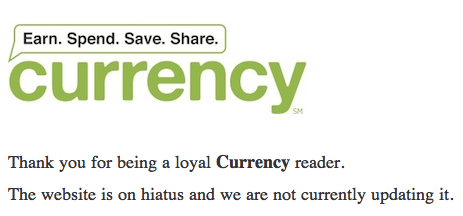
This activity makes no sense. Unless the guy in the Oxfords is placing the penny down to see which cheap soul picks it up.
It’s amazing how many people will congratulate themselves for such money-saving machinations as calling the cable or phone company to get their monthly bills reduced by a buck or two, yet won’t expend similar effort to save themselves tens of thousands. Here’s an example:
You borrowed $200,000 to finance your house 5 years ago at 6.57%, after putting 20% down. Should you refinance?
Yes.
30-year rates are now 3.47%, 15-year rates 2.84%.
Your balance should now be $187,124.51. (That’s right. After 5 years, 94% of your balance remains. Pretty impressive, huh? Sorry, but this is how interest works. It’s why you should be a lender.)
You can pay 6.57% on the $187,124.51 for the next 25 years, continuing to make monthly $1,273.36 payments. But if you refinanced, you’d pay:
$1,277.90 a month for the next 15 years. For an extra 4½ bucks a month, you could burn your mortgage a decade quicker. Would that be worth it?
Depends on how much refinancing costs are.
We’re assuming that your credit is good. If your credit isn’t good, refer to page 33 in Control Your Cash: Making Money Make Sense and treat consumer debt like the hantavirus that it is. If you’re carrying balances on your credit cards, balances that you pay the minimum on and don’t expect to pay off for years, dig deeper. You’re an individual, not a government. You can’t do this indefinitely, and better you endure brief sharp pain than enduring dull pain. In fact, you shouldn’t even be wasting your time reading blog posts. Go out and get a second job, and stop spending money beyond the essentials. Once you’ve done that, and you’ve eliminated your consumer debt, come back.
(Good. With those folks out of the way we can get down to business.)
So what are the costs of refinancing, anyway?
The largest expense is the loan origination fee, which will almost always be 1% of the new loan. $1,871.24.
Appraisal fee. The lender doesn’t want to refinance your lean-to at Windsor Castle prices. Call it another $500.
Inspection fee. Even if it is a lean-to, it needs to be habitable. Pencil in another $225 or so. You’ll also need a pest inspection. Maybe $50 if you live somewhere like North Dakota, $75 if you’re in Florida, The Palmetto Bug State. You might also need a flood certification, $75, to prove you live (or don’t) in a flood zone.
There are also credit reporting fees at around $150. Plus recording – formalizing and registering the transaction documents with your county assessor’s office or whomever. Call that $35.
Depending on which state you live in, a reprobate lawyer might need to get his piece of the action. $750 for attorney review, because reading a series of boilerplate documents requires someone with an advanced degree and a goodly amount of self-loathing.
There may be other fees too. When you ask your lender to quote a rate, make sure they include a breakdown of all closing costs, including the costs charged by any closing agent. Compare the interest rates of any “no-cost” refinance to one with costs. Lenders will usually increase the loan’s interest rate by 25-50 basis points to cover the costs not collected up front.
Tally it up, and that’s $3,681 for the privilege of paying another $230,022 over the next 15 years, instead of paying $382,008 over the next 25 years. An investment that pays 41-fold, maybe minus a few multiples for the accelerated payoff. Hopefully you don’t need to be convinced further that that’s a fantastic deal.
Last week we wrote Part I of how we manage to remain liquid, comfortable, and reasonably affluent in Year 5, maybe 6 of The Recession That Politicians Wouldn’t Let Wither. Some people thanked us for and were inspired by the first-person perspective. Others decried us as out-of-touch and haughty with no understanding of the world beneath us, Mitt Romneys in a sea of 47-percenters.
The secret to building wealth is that you don’t need to shoot superlatively high. Sure, Sergey Brin and Larry Page beat you to the idea of creating a search engine that could metastasize into an entire online ecosystem, where hundreds of millions of people willingly share personal information that can be monetized. Brin and Page are billionaires several times over, while you aren’t and never will be unless Obamanian/Bernankite hyperinflation becomes reality. Does that mean you should look for the next cosmically resonant opportunity instead, which simple probability dictates that you’ll probably fail at?
NO. There are other choices beyond aiming that high, and aiming small. Taking a few hours to save $152,000 over the period of a home loan is what people with a wealthy mindset do. The ones who don’t, don’t because it:
- Is more involved than just picking up the phone and calling Verizon Wireless’s billing department.
- Involves using the services of other people, some of them experts who charge fairly for those services.
- Requires a little math.
- Might result in nothing. (If there were less of a difference between current mortgage rates and what you’d borrowed at originally, for instance.)
Cursing the darkness might make you feel briefly better, but that’s not what we do here at Control Your Cash. Instead, we prefer to take aggressive, intensive steps to significantly increasing revenue (or significantly reducing expenses.) If you’re going to chase pennies, chase them tens of thousands at a time.




